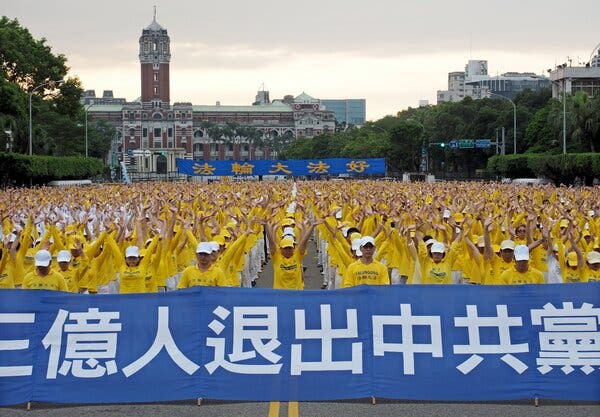Supported by
How a Persecuted Religious Group Grew Into a Global Movement
Founded in China in the early 1990s, Falun Gong unsettled Chinese government officials and quickly became subject to brutal repression. It has prospered nonetheless.

The posters are instantly recognizable, a fixture on storefronts around the world whenever the Shen Yun Performing Arts show comes to town. Featuring graceful dancers in billowy costumes, the ads promise a glimpse of “China before Communism.”
The show is one of the most visible parts of the Falun Gong spiritual movement, whose three-decade history includes a brutal crackdown in China, claims that its members’ organs were harvested and a transnational repression campaign that continues to this day.
On Friday, The New York Times reported that Shen Yun’s young performers have been regularly subjected to emotional abuse and manipulation.
Since its introduction in China about 30 years ago, Falun Gong has gained a global following comprising Chinese immigrants and non-Chinese practitioners alike. They have extolled the health benefits of its meditative exercises.
Precise estimates of the number of Falun Gong followers are difficult to obtain because the movement says it has no formal membership system. Falun Gong’s press department says it has followers in more than 100 countries, including about 10,000 who live in the United States.
Here’s what to know about the movement, its persecution in China and how it all connects to Shen Yun:
How did Falun Gong begin?
In 1992, a former grain clerk named Li Hongzhi began delivering lectures across China to introduce a new spiritual discipline called Falun Gong, also known as Falun Dafa.
At the time, ancient energy-based exercises — known as qigong — were surging in popularity, part of a revival of religious life after the death in 1976 of Mao Zedong, the Chinese leader who had tried to stamp out traditional culture.
Mr. Li prescribed a set of exercises that included slow movements of the hands and arms meant to circulate energy around the body. Falun Gong believers practice by doing the exercises in public parks, meditating and reading Mr. Li’s texts, known as “Fa study.”
In interviews, current and former Falun Gong practitioners said Mr. Li gave their lives a sense of purpose, offering a road map to becoming a more moral person. Many say their illnesses were healed after they began practicing.
Starting around 1995, Mr. Li took his lectures overseas to cities like Sydney, Australia, and Paris, building a global base of followers. Within a few years, he was directing the movement from his new home in New York, where he had settled with his family.
What is Falun Gong’s belief system?
The core tenets of Falun Gong are truth, compassion and tolerance.
The practice — which Mr. Li explains in his primary text, “Zhuan Falun” — incorporates aspects of Buddhism. He teaches followers to eliminate their attachments and to look inward instead of blaming others. The goal of the practice is enlightenment.
Many Falun Gong practitioners try to avoid medical treatment when they are sick. Mr. Li teaches that negative karma causes illness and that it can be eliminated by enduring hardship and committing to his “cultivation” method. True believers in his teachings can expel illness from their bodies without medical treatment, he says.
Mr. Li’s teachings also contain mystical elements. He says advanced practitioners can develop supernatural powers, like the ability to levitate and see through walls.
In the past two decades, Mr. Li’s teachings have taken on an apocalyptic tone. He has frequently talked about how practicing Falun Gong can save people from destruction during the “end times.”
How does the Chinese government view the movement?
In April 1999, more than 10,000 Falun Gong followers held a peaceful rally in front of the Communist Party leadership’s walled compound in Beijing. Falun Gong’s ability to mobilize its followers deeply unsettled China’s rulers, who were wary of any organization they could not control.
After the rally, the authorities banned Falun Gong and issued an arrest warrant for Mr. Li, who had already moved to the United States. The group was declared an “evil cult” on the front pages of party newspapers. The movement has vehemently denied being a cult.
Thousands of Falun Gong practitioners were sentenced to prison or labor camps, according to a Human Rights Watch report. People were beaten in detention facilities until they renounced their belief, and many died in police custody.
Chinese officials have denied that Falun Gong adherents were tortured.
In a statement, representatives of Shen Yun and Falun Gong said that practitioners “continue to die at the hands of Chinese officials.”
Falun Gong has also said its followers were the targets of a mass program by the Chinese government to harvest their organs while they were in prison.
Chinese officials have acknowledged that organs of executed prisoners were a primary source for transplant surgeries in Chinese hospitals but denied the allegations of harvesting organs from Falun Gong practitioners or any other detainees.
Nicholas Bequelin, a senior fellow at Yale Law School’s Paul Tsai China Center, who has documented the use of prisoner organs, and other leading experts on human rights in China say that there is no evidence of a systematic program to execute Falun Gong practitioners for their organs. Some practitioners, like other Chinese prisoners, may have had their organs removed if they were executed or had died in prison, he said.
China banned the practice of harvesting organs from executed prisoners without their prior consent in 2015.
How does the persecution relate to Shen Yun?
In 2006, Mr. Li helped create Shen Yun in part to educate a wider audience about the persecution. He and his lieutenants oversee the group, and many practitioners see it as a sacred honor for their children to be selected as performers. Shen Yun says its mission is to revive the traditional culture that had been destroyed after the Communist takeover in China.
During the two-hour show, some of Shen Yun’s dance pieces show Falun Gong practitioners being beaten by dancers dressed as Chinese state police — or having their bloody organs placed in a box.
Since the persecution began, attacking the Chinese government has been a dominant theme in Mr. Li’s writings. He has told his followers that it is their responsibility to “clarify the truth” about the Chinese Communist Party, including by urging people to see a Shen Yun show.
Has China’s targeting of Falun Gong continued?
Yes. Last month, two men pleaded guilty in New York to bribing someone they believed to be an I.R.S. agent as part of a plot to target Falun Gong practitioners in the United States. They admitted to acting as illegal Chinese government agents. Their goal, according to federal prosecutors in Manhattan, was to revoke the tax-exempt status of an entity run by Falun Gong practitioners.
The two men had also surveilled Falun Gong followers at the group’s headquarters in Orange County, N.Y., according to an F.B.I. interview cited in a court document.
In another recent case, federal prosecutors in Florida accused a man of providing information about Falun Gong members to a Chinese intelligence officer.
Chinese government employees have also previously tried to stop Shen Yun performances.
A few years after Shen Yun began coming to the Peabody Opera House in St. Louis, now called the Stifel Theatre, a Chinese consular official from Chicago visited to urge the venue not to let the group perform there, according to its booking director, Darren Hall.
In an interview, Mr. Hall said the consular official offered no reason except that Falun Gong members chant outside buildings and sometimes shut down roads in China. Mr. Hall declined the request.
Olivia Wang contributed reporting.
Nicole Hong is an investigative reporter, focused on covering New York and its surrounding regions. More about Nicole Hong
Michael Rothfeld is an investigative reporter in New York, writing in-depth stories focused on the city’s government, business and personalities. More about Michael Rothfeld
Tiffany May is a reporter based in Hong Kong, covering the politics, business and culture of the city and the broader region. More about Tiffany May
Advertisement


